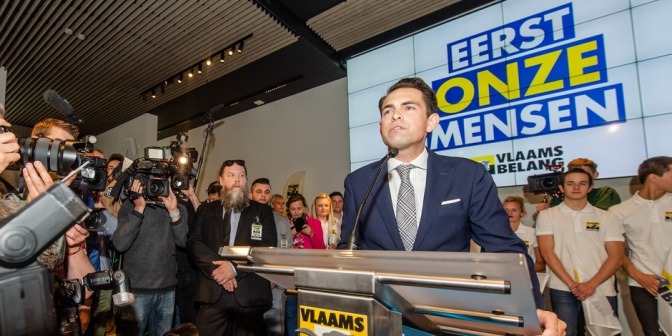Following a federal, regional and European vote at the weekend, Belgium’s political scenario on Monday appeared as divided as ever, with some speaking of a phenomenon of “a Belgium split in two” — as preliminary results revealed a country torn in half across partisan lines.
To the north of the country, the Flemish region voted overwhelmingly to the right, keeping the right-wing Nieuw-Vlaamse Alliantie (NV-A) in the driving seat, after it obtained just under 25 per cent of the vote.
But Flander’s biggest winner on Sunday was the far-right Vlaams Belang (VB), to which voters handed a significant victory, helping it become the second-largest party in the Dutch-speaking region after it gained just over 18 per cent of the vote: over 20 seats, up from 3 in the 2014 elections.
In the Brussels region, votes went to the left-leaning Parti Socialiste (PS), with green party Ecolo surging in the capital region, capturing around 19 per cent of the vote. Outgoing Prime Minister Charles Michel’s party, Mouvement Reformateur (MR) landed in the third position.
Related News: Belgium's far-right not ruled out of potential coalition
To the south, preliminary results show that although the left-leaning Parti Socialist (PS) kept its dominant spot in the French-speaking Wallonia region —earning about 26 per cent of the vote— it registered some significant losses since the last regional elections, with the MR coming closely behind at about 21 per cent.
The vote at the federal level was no less disparate than the regional one, meaning that forming a federal government coalition will be no easy task. Traditional parties remained in a leading position, with right, left and liberal parties grabbing the most seats, but green formations surged after capturing more significantly larger portions of the vote.
As the final results are coming in, the NV-A appears poised to claim the spot of the largest party in the federal parliament, claiming 25 seats. After the right-wing nationalist party, the left-leaning socialist groups captured a combined 29 seats (PS:20;sp.a 9).
Francophone greens Ecolo became the biggest green formation in parliament, capturing 13 seats (7 more seats than in the previous elections), and Dutch-speaking Groen won 8 seats, up from 6 in 2014.
NV-A leader Bart de Wever has already said that he will not accept to form a federal ruling coalition “without a clear Flemish majority,” raising the question of whether a 1991 agreement to exclude working with the far-right VB from would continue to stand.
Sunday's election results led many to talk of a "black Sunday" for Belgium, wondering if the progression of far-right forces in the polls should raise concerns about an increase in radicalisation, and raising questions about how to govern a country so clearly divided.
Gabriela Galindo
The Brussels Times

